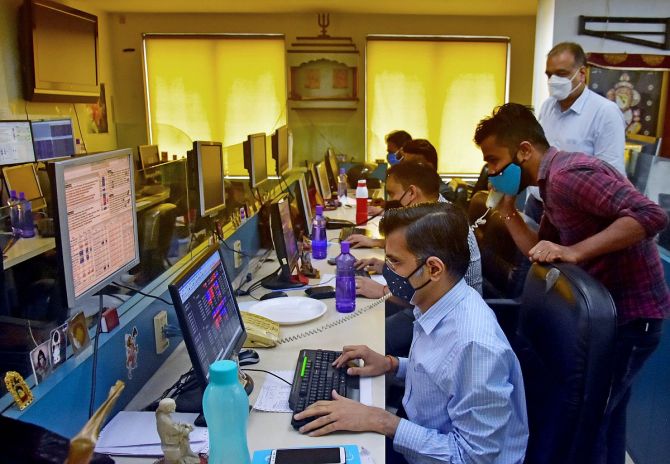 | « Back to article | Print this article |
The liquidity-fuelled rally will continue for some time, however, fundamentals are getting stretched.

Even as concerns are raised about the disconnect between markets and real economy, French brokerage BNP Paribas on Thursday said equities will continue the northward trajectory and the 30-share benchmark will gain over 6 per cent by March 2021 on easy liquidity.
Stating that there is a "limited downside hereon", analysts at BNP Paribas said the benchmark Sensex will touch 41,500 points by the end of the fiscal as against near 39,000 points level on Thursday.
It can be noted that many watchers have been surprised by the continuing rally in the markets even as the economy has nosedived into contraction mode because of the COVID-19 pandemic-related lockdowns, which have not been fully effective in controlling the infections.
The brokerage's head of India equity research, Amit Shah, told reporters that the liquidity-fuelled rally will continue for some time, but cautioned that fundamentals are getting "stretched".
Lauding retail investors' play of buying during the correction in March, Shah pointed out that there has been a smart retreat from buying lately as the markets have gone up, and added that this is the rare occasion when retail investors seemed to have timed the market correctly.
The brokerage house feels India does not have the ability to create businesses of tomorrow the way the US or China does, and the only strength which India is left with is the size of the consuming population at over a billion people.
Taking this as the driving theme, the house has selected eight stocks which will outperform and given it the acronym 'Bharath', which include Bharti Airtel, HDFC Bank/HDFC Life Insurance, Asian Paints, Reliance Industries, Avenue Supermarkets, TCS and Hindustan Unilever.
Analysts at the house feel the shift to work from home (WFH) across sectors will benefit a bulk of these select categories of stocks, and pegged the upside to this list of scrips at 16 per cent despite the high valuations.
In the same way as rich continue to become richer, Shah said, valuations of these stocks will continue to go up, driven by domestic consumption.
"India is all about people. That is one thing we have to give to the world," he explained.
For the financial sector, the brokerage pegged investments in technology at over $15 billion till 2023, higher than earlier estimates, because of the pandemic-related shift in consumer behaviour.
Banks which do not make investments in mobile banking and digital will lose deposits to the digitally active ones, it warned, adding that an estimated 20 per cent drop in rentals in FY21 will lead to a benefit of 1.27 per cent on cost to income ratio.
Companies in the information technology sector will save over 2.5 per cent in their costs as a large share of employees continue to WFH, it said, adding that 40 per cent of the overall staff will continue to WFH even after normalcy returns.
The large IT companies like TCS will be leading the shift to WFH, while the smaller ones will be more circumspect, it said.
For two-wheelers, BNP Paribas expects a shift to premium bikes from commuting bikes segment as people ride more for leisure purposes.
Telecom will benefit throughout and the first opportunity is in the broadband space given the low penetration of fixed lines and also the need for better connectivity as jobs shift to homes, the analysts said.
In realty segment, there may not be high correction beyond what has already happened, but there will be a shift to buying bigger units in semi-urban areas or pockets in the periphery of a city as the premium for staying close to place of work wears out, they said.
The 30-share benchmark Sensex closed at 38,990.94 points on Thursday.
Photograph: Utpal Sarkar/ANI Photo